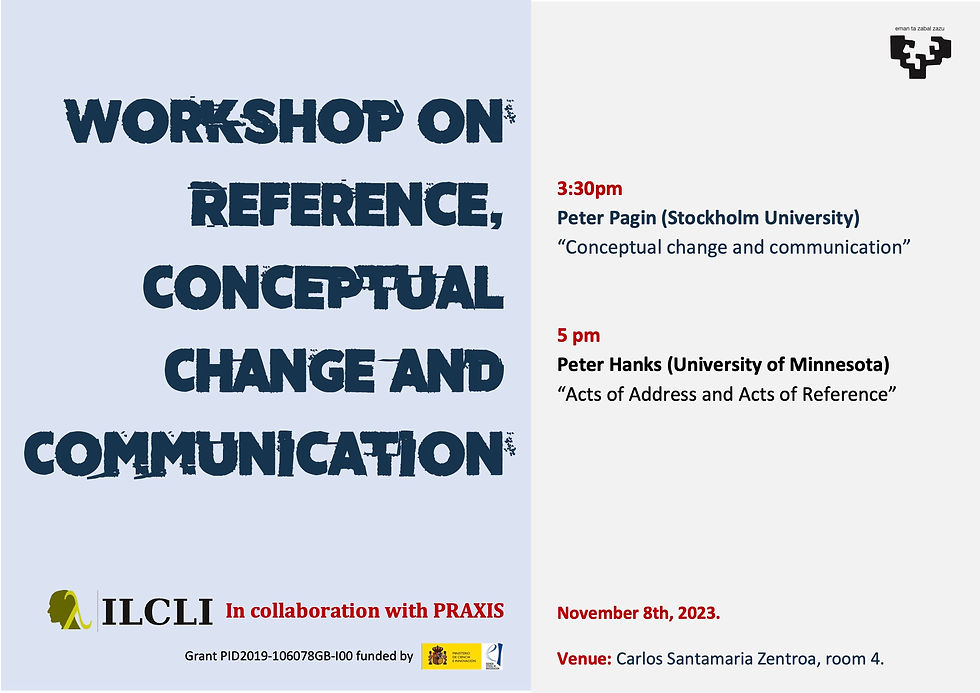Workshop on Reference, Conceptual Change and Communication
- LAT
- Oct 30, 2023
- 3 min read
Updated: Jul 18, 2024
Co-organized by LAT and PRAXIS
November 8th, 2023.
Venue: Carlos Santamaria Zentroa, room 4.
Peter Pagin (Stockholm University)
Conceptual change and communication
Abstract:
Communication fails when the thought expressed by the speaker is very different from the resulting thought picked up by the hearer. Some philosophers, including me, have argued that some differences are tolerable and hence compatible with communicative success. But then, how much difference is too much? I have argued that a lower boundary of success is sameness of truth value. If you expressed a true proposition and what I picked up is a false one, then, intuitively, communication failed.
It is natural to align communicative success with the truth of belief reports: if I understand what you expressed, I should be able to truly ascribe the thought to you by using the same expressions as I understand them. It is also natural to align both with belief updating, and hence with inquiry. I will not revise my belief by rejecting a sentence, when unbeknownst to me, the sentence expresses a thought very different from what it did express at the time when I affirmed it.
This has a bearing on the problem of topic change in conceptual engineering. In one type of case, the conceptual engineer replaces the concept C as expressed by an expression E by a different concept C'. The risk that the change from C to C' is a change of topic has been discussed in the literature. I will be concerned with the general connection between communication and conceptual change, and in particular with the claim by Herman Cappelen that topic can be preserved across conceptual change even when it results in a change of extension.
Peter Hanks (University of Minnesota)
Acts of Address and Acts of Reference
Abstract:
Acts of address, as I will use the term, are acts in which a speaker uses a linguistic expression to get or maintain the attention of an addressee. Vocative uses of proper names are paradigm examples, e.g. "Charles, the guests have arrived" or "Camilla, where is the wine?". In this talk I will argue that acts of address are not acts of reference. In other words, when a speaker addresses someone they do not refer to the addressee. The argument, in a nutshell, is as follows. If an act of reference takes place then it contributes to the subject matter of the speech act in which it occurs. Acts of address can occur without contributing to subject matter. Therefore, acts of address are not acts of reference. Much of this talk will be devoted to spelling out this argument, in particular the relevant notion of subject matter. The conclusion of the argument is important for a number of reasons, but here I will draw out two consequences about the contents of proper names. First, the content of a name cannot be any object or property. The content of "Charles" cannot be Charles himself nor a property like person called Charles. Neither of these can capture the difference between using "Charles" to address versus using it to refer. To capture this difference, the content of "Charles" must be a type of action. Second, even if we individuate names in terms of their referents, names behave like indexicals. The content of the name "Charles" changes from one context of use to another, even if the referent stays the same. The change in content is a change in the kind of action performed using the name.



Comments